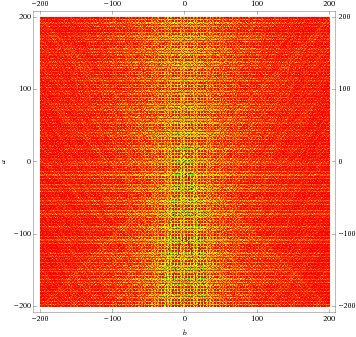Ulam
 Image Credit: Wolfram
What percent of the first three million positive integers yield a prime when the following polynomial is evaluated by them:
Image Credit: Wolfram
What percent of the first three million positive integers yield a prime when the following polynomial is evaluated by them:
n 2 + n + 4 1
The answer is 24.
This section requires Javascript.
You are seeing this because something didn't load right. We suggest you, (a) try
refreshing the page, (b) enabling javascript if it is disabled on your browser and,
finally, (c)
loading the
non-javascript version of this page
. We're sorry about the hassle.
2 solutions
Here is my parallel C++ code. I was using Fermat primality test (after all, there are only few pseudo primes more than real primes). The code is iterative. I start with the list [ 1 , 2 , … , 3 ⋅ 1 0 6 ] . In each iteration cf. function s i n g l e I t e r a t i o n P a r ), I remove from the list the numbers n , for which the value n 2 + n + 4 1 does not pass the Fermat primality test (with single base/witness).
The Fermat primality test is implemented in the function i s P r o b P r i m e .
1 2 3 4 5 6 7 8 9 10 11 12 13 14 15 16 17 18 19 20 21 22 23 24 25 26 27 28 29 30 31 32 33 34 35 36 37 38 39 40 41 42 43 44 45 46 47 48 49 50 51 52 53 54 55 56 57 58 59 60 61 62 63 64 65 66 67 68 69 70 71 72 73 74 75 76 77 78 79 80 81 82 83 84 85 86 87 88 89 90 91 92 93 94 95 96 97 98 99 100 101 102 103 104 105 106 107 108 109 110 111 112 113 114 115 116 117 118 119 120 121 122 123 124 125 126 127 128 129 130 131 132 133 134 135 136 137 138 139 140 141 142 143 144 145 146 147 148 149 150 151 152 153 154 155 156 157 158 159 160 161 162 163 164 165 166 167 168 169 170 171 172 173 174 175 176 177 178 179 180 181 182 183 184 185 186 187 188 189 190 191 192 193 194 195 196 197 198 199 200 201 202 203 204 205 206 207 208 209 210 211 212 213 214 215 216 217 218 219 220 221 222 223 224 225 226 227 228 229 230 231 232 233 234 235 236 237 |
|